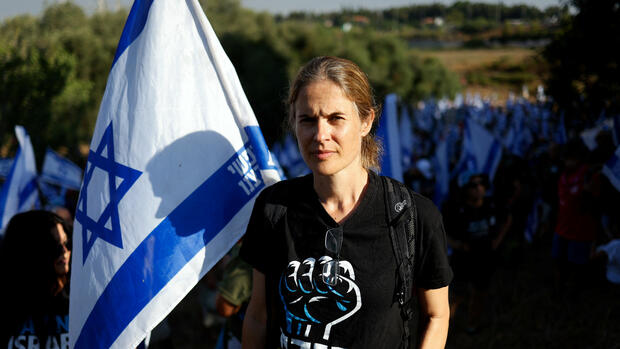Berlin Shikma Bressler’s fight started in January. Every Saturday evening she stood like a general in front of the 100,000 to 150,000 citizens who protested in the center of Tel Aviv against the controversial judicial reform in Israel.
Their uniform: A black T-shirt with the words “Democracy” printed on it. She urgently warns of the consequences of the restructuring of the judiciary and the influence of the ultra-Orthodox. “We don’t want this country to be taken over by fanatics with their beards and their religion.”
“We are fighting for the basic values of our country!” she shouts and: “We will prevent the government’s dictatorship laws” or “We will not give in” while holding the blue and white Israeli flag. In addition, demonstrators drum and chant: “De-mo-kra-tie”. If Bressler mentions the reform plans or their authors, they shout “Busha” (disgrace) as if in chorus, or blow whistles.
In the end, Bressler’s efforts didn’t help. Although they organized a march with thousands of people from Tel Aviv to Jerusalem over the weekend, the demonstrators were unable to stop the vote on a key element of the controversial reform in the Knesset on Monday.
The Israeli parliament approved the bill by Prime Minister Benjamin Netanyahu’s right-wing religious coalition by a vote of 64 to zero. All opposition MPs stayed away from the vote.
Despite mass protests: Israel’s parliament passes judicial reform
The passage removes the Supreme Court’s ability to overturn government decisions as “inappropriate.” The opposition rejects this as an interference with the independence of the judiciary and as a gateway for corruption and abuse of power.
Reform divides society in Israel
Bressler is part of a broad protest movement. The reform is dividing large parts of Israeli society, and many secular Israelis fear that their country could turn into a religious state. Thousands of people have blocked roads and train stations across the country for the past week in a bid to prevent the vote.
Bressler, 43, is a physicist at the Weizmann Institute of Science, a world-renowned research center south of Tel Aviv. Bressler manages a laboratory for particle physics with around a dozen researchers at the institute.
>> Read here: Judicial reform in Israel – Supreme Court loses some of its power
The physics professor regularly flies to Switzerland to the CERN nuclear research center in Geneva. There she is responsible for one of the most important Israeli contributions to the Atlas experiment at the Large Hadron Collider (LHC), the largest and most powerful particle accelerator in the world.
According to Cern, Bressler’s project aims to exploit the full discovery potential of the particle accelerator “and expand the frontiers of scientific knowledge”.
Netanyahu’s reform has numerous prominent opponents
When Bressler, sometimes a little hoarse and with a rough voice, stands in front of the crowd and her speeches are broadcast several times over loudspeakers and screens, she comes in handy with a skill she has acquired over the course of her career as a scientist.
She must be able to stand up in front of colleagues, explain complex issues to them and convince them that she is pursuing a promising approach, she says. She uses this art in the fight against judicial reform.
The Israeli prime minister is controversial among the country’s population.
(Photo: IMAGO/epd; AndreasxFischer)
It brings together prominent opponents of the judicial reform, including bankers, technicians, teachers, high-tech entrepreneurs, fighter pilots, former judges and security officers, who support the opposition to the planned radical changes in the system of government.
At Cern, where Bressler is working on a long-term project, even the smallest deviations from the standard model have the potential to become very important at a later point in time, she knows. But when they are deployed in Israel, time is of the essence and the imminent danger must be defused quickly.
Protests against judicial reform continue
Even after the defeat in the Knesset, she does not want to give up. And she also has numerous allies: After the vote in the Israeli parliament, the protests in the country spread, and there were clashes between demonstrators and police officers.
Many doctors, nurses and other medical personnel stopped work on Tuesday, and several Israeli newspapers published a blacked-out front page.
A total of 150 parliamentary initiatives are pending, which are based on religious laws and are intended to further weaken the Supreme Court.
The Cern researcher wants to prevent all of this, not in the laboratory with a model, but on the street with the help of the masses: “As long as the reform is not put on hold, the protest movement will not rest,” she promised before the vote. Because this is a crucial battle in Israel’s modern history, “a battle that will determine our future.”
More: “No market without democracy” – the tech scene rebels against Israel’s judicial reform
